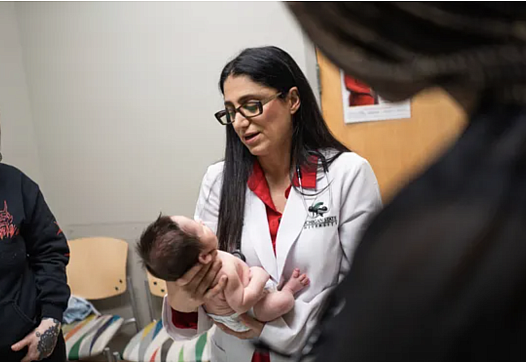What happens when you give moms and babies $7,500? Flint is finding out
The story was originally published by the Detroit Free Press with support from our 2024 Data Fellowship.
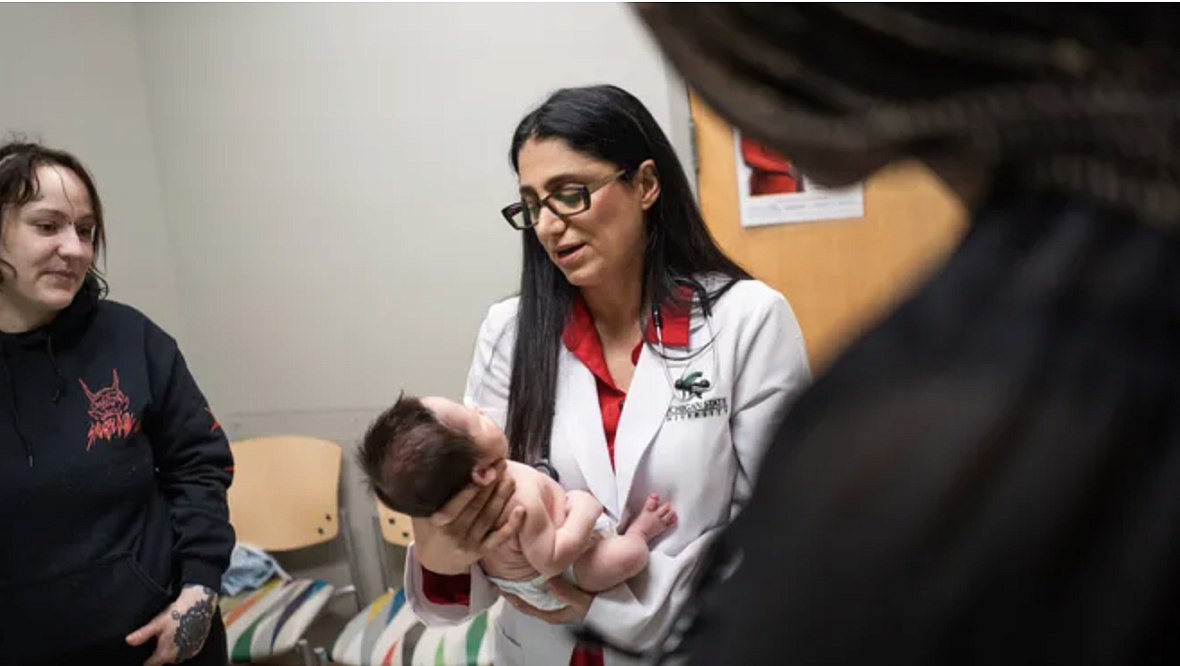
Dr. Mona Hanna-Attisha talks lead-in-water issues at 'Fahrenheit 11/9' premiere
Dr. Mona Hanna-Attisha was at the Michigan premiere of Michael Moore's new movie, and spoke about rising awareness of lead-in-water issues in U.S.
Julie Hinds, Detroit Free Press
Flint is the city that fights back, says Dr. Mona Hanna. She's the Flint pediatrician who raised the alarm about the city's water crisis.
She's also the co-director of Rx Kids, a program that provides cash to expectant moms mid-pregnancy and the first year of the infant's life. Pregnant mothers get a $1,500 lump sum and then, after the baby is born, $500 a month, for a total of $7,500.
In January, Rx Kids launched in Flint, a city where 59% of those under 18 years old are living below poverty and this year marked a decade since a water supply switch exposed tens of thousands of individuals to lead contaminated drinking water.
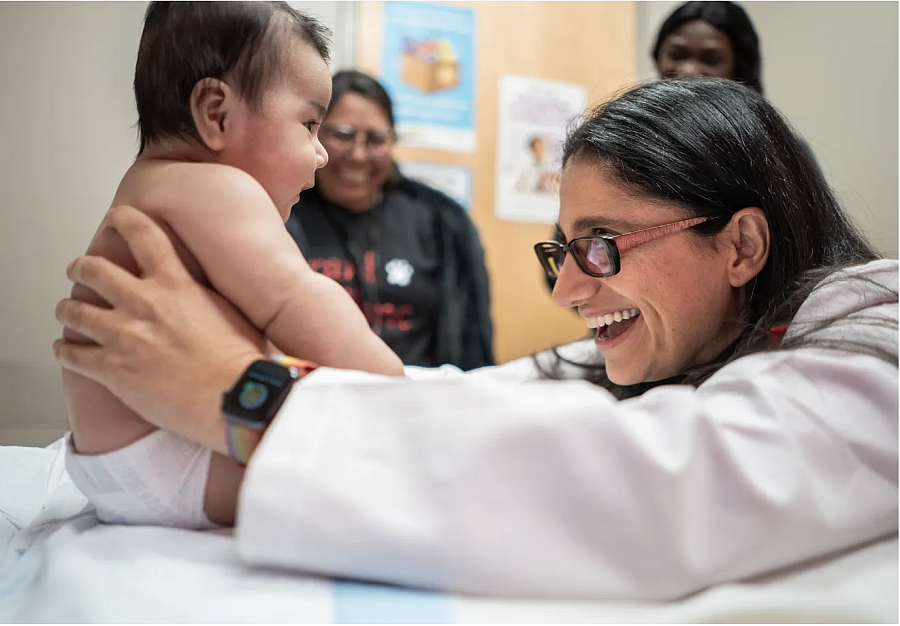
Michigan State University pediatrician professor Dr. Mona Hanna does a checkup with 4 month-old Daylani Diaz-Lopez, left, as interpreter Perlita Irish, center, stands by during a teaching clinic at MSU and Hurley Children's Hospital in Flint on Wednesday, April 24, 2024. "Our work hasn't been about proving causation. Our work is about putting into place goodness so we don't see the full effect of this Water Crisis," said Hanna-Attisha. She says they have been working on secondary prevention to limit, mitigate and buffer the impact of the Water Crisis. "It's hard not being able to answer if symptoms a child is going through are from exposure to the water but making sure families are getting the resources and the support they need.
Ryan Garza, Detroit Free Press
"Flint is the city that fought back, that refused to accept the status quo, that said, 'No, we're not OK with poison water.' In that same spirit, Flint is leading the way and saying, 'Hey, we're not OK with our babies growing up in poverty,'" Hanna said.
Rx Kids has so far distributed about $4.7 million to more than 1,200 families in Flint, as of early December. The program, which does not have income requirements, has a goal to eliminate maternal infant poverty. Hanna said the uptake of Rx Kids in Flint suggests that's working. More than 90% of the babies born in Flint are part of the program, she said.
The program received $20 million in a state budget allocation to allow it to grow beyond Flint to communities across Michigan. Next up: Kalamazoo.
Both in Flint and Kalamazoo, the programs rely on a combination of public and philanthropic dollars, from funders like the Charles Stewart Mott Foundation, Stryker Johnston Foundation and the Kalamazoo Community Foundation. Rx Kids needs philanthropic funds to make it available to moms, in areas it is slated to launch, regardless of their income, program leaders have said.
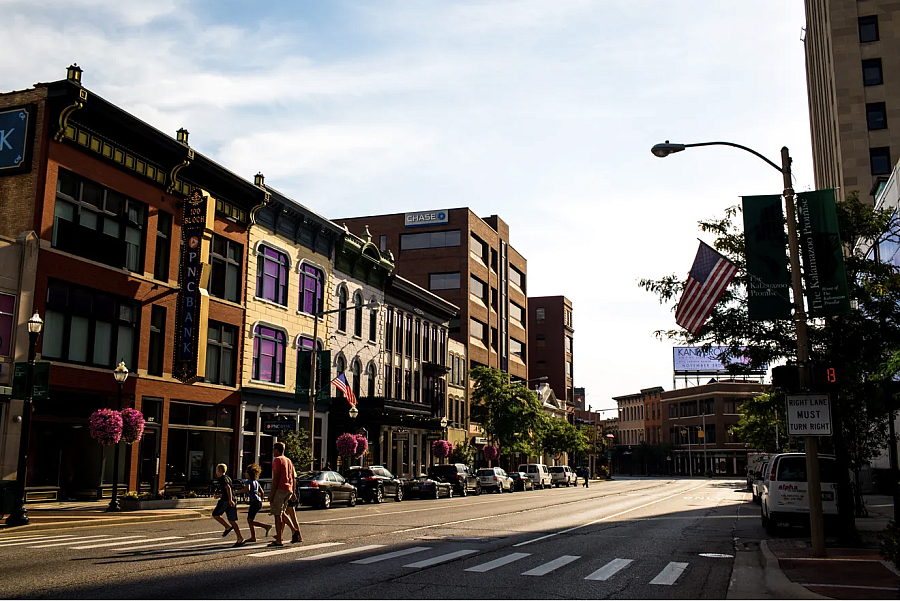
The corner of East Michigan Avenue and South Kalamazoo Mall in downtown Kalamazoo on Friday, Aug. 26, 2016.
Andraya Croft, Special To The Detroit Free Pres
Rx Kids is co-directed by Hanna, associate dean of public health at the Michigan State University College of Human Medicine, and Luke Shaefer, who heads up the University of Michigan's Poverty Solutions initiative.
Recently, the Free Press spoke to Hanna about Rx Kids as the program nears the end of its inaugural year and raises funds to launch in other parts of the state in 2025. The interview was edited for clarity and length.
QUESTION: Can you tell me why you started Rx Kids? What was your personal motivation?
ANSWER: So much of what ails my children that I care for, so much of what makes people sick at a population level, the root cause is poverty. It is widely recognized as a leading social determinant of health.
Q: Why focus on pregnant moms and babies?
A: Towards the end of pregnancy, moms often have to come out of the workforce. They lose income. Babies are expensive. This is one of the time periods where families have to spend a lot of money on novel things, like car seats and strollers and diapers ... and there's lots of other out of pocket expenses, like medical care. And then once a baby is born, moms are often still out of the workforce. We have no paid leave policies in the United States, which is very anomalous compared to other countries. And then child care is also very expensive. So this window of pregnancy, infancy is when families are the poorest across the entire life course. And then that's also really the most important period in child development.
Q: What were you seeing as a doctor, as a pediatrician in Flint, that pushed you to start Rx Kids. What are some of those specific moments that motivated you?
A: It's the kid that comes in with failure to thrive because of inadequate diet. It's a kid that comes in with obesity because they don't have access to healthy food in their neighborhood. It's missed appointments because kids don't have reliable transportation to get to the doctor. ... All of these things, if you peel back and ask, 'why, why, why' can (it) be rooted to poverty. ... When you look at things at a population level — not just at the individual level — we have so many disparities that are racial and demographic that can also be kind of traced back to poverty.
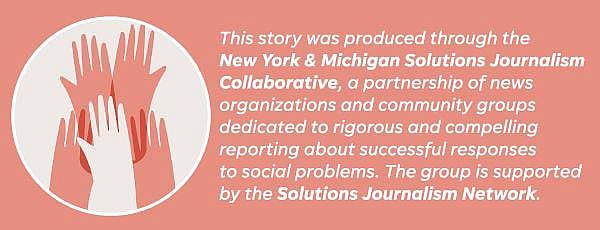
New York and Michigan Solutions Journalism Collaborative
Illustration By NY & Michigan Solutions Journalism Collaborative; Graphic By Brian McNamara, Detroit Free Press
Q: In what ways did the water crisis — which I know that you were pivotal in calling the alarm on in Flint — impact the decision to start our RxKids in Flint?
A: The water crisis was fundamentally about poverty, because we were a very poor city and a near bankrupt city that got taken over by the state and we had financial emergency managers running the city. So that was one of the causes besides obviously the lost democracy by being taken over and the water storage and denial of science and crumbling infrastructure. All of these are big lessons that are playing out and have played out ... but since the moment of kind of recognizing and uncovering the water crisis, my work in Flint — as so many folks in Flint — has been about recovery. What can we do to mitigate the impact of this water crisis? And we've done amazing things in Flint. We put in, for example, high quality child care and expanded Medicaid and nutrition programs and trauma informed services. ... As a community, we have been doing so much to promote the health and development of children. Yet, once again, there's this thing that has been missing in our toolbox, something I wish I had in my doctor's bag, and despite all the goodness that we've been able to do, we haven't been able to address poverty. ... The water crisis has enabled a lot of us to think differently, to refuse the status quo, to not be OK with how things are, but to reimagine how things can be, and not to just think about it, but put it into play.
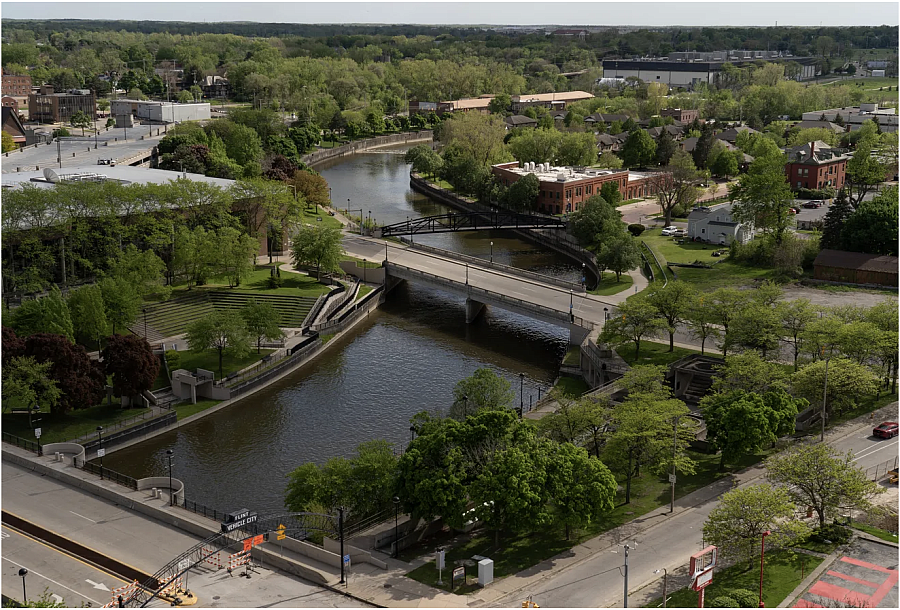
The Flint River winds around the view as a section of Saginaw Street leading into downtown Flint remains closed as work continues on the bricks that line the street on Wednesday, May 8, 2024.
Ryan Garza, Detroit Free Press
Q: What are your takeaways from running this program for a year? Anything surprised you? Anything unexpected?
A: Still a lot of disbelief that we were able to do this. There's a lot of kind of joy from the families, from really everybody who interacts with this program. I think everybody recognizes how historic this was, to be able to do this thing that has never been done before, that so many people thought wouldn't be possible. There's a lot of sleeplessness because of the desire to continue to work, to expand the work. Every single day we get communication from somebody who lives somewhere else or another community that wants to do this.
Q: What's next for Rx Kids?
A: It's the continued expansion, making sure that it is up and running in other low-income Michigan communities. ... We are deep in the weeds of the evaluation, so making sure that we can look at the data and get that data out as quickly as possible, to share our findings, so that we can continue to inform policy, to make an impact in the lives of, once again, children and families all over.


